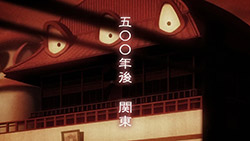 |
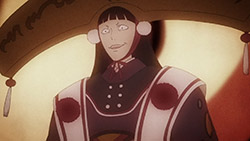 |
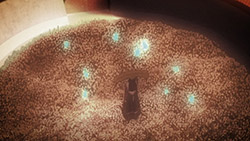 |
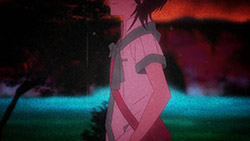 |
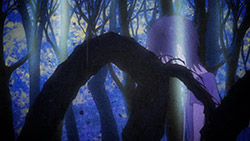 |
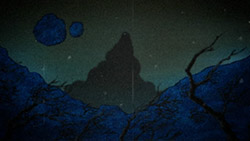 |
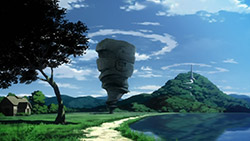 |
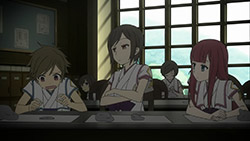 |
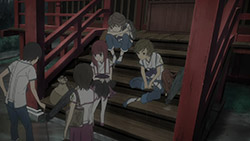 |
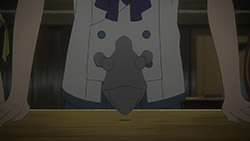 |
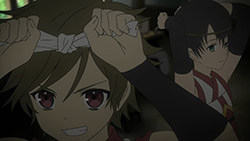 |
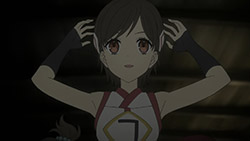 |
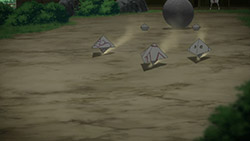 |
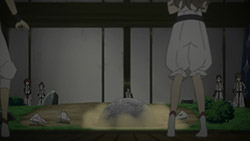 |
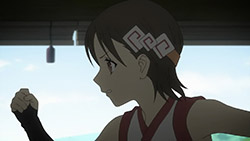 |
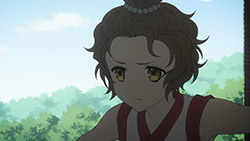 |
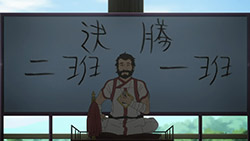 |
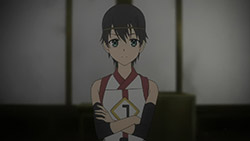 |
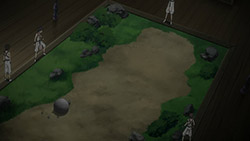 |
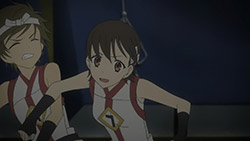 |
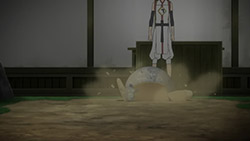 |
 |
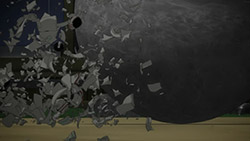 |
 |
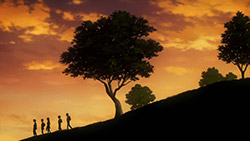 |
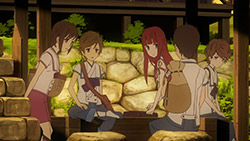 |
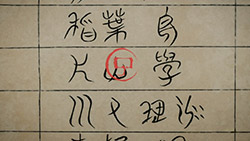 |
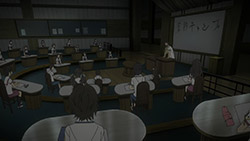 |
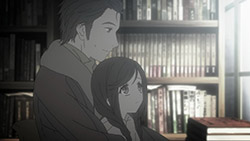 |
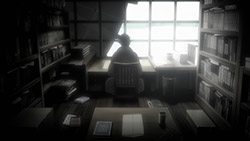 |
 |
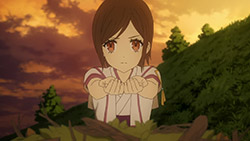 |
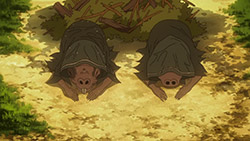 |
 |
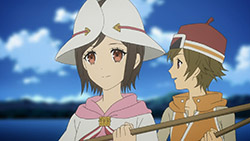 |
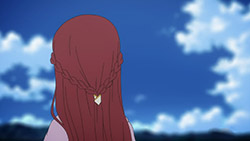 |
「消えゆく子ら」 (Kieyuku Kora)
“Vanishing Children”
Is this going to be a trend until we finally get some real answers about the backstory of this new world? The second episode of Shin Sekai Yori opens up once again to another short, foreboding flashback into the distant past of its setting, one that is set some 500 years after the gruesome psychic display of the premiere. Again, this is a scene that makes little sense, but it set a disturbing tone for the rest of the episode to follow. It’s a twisted scene, where the fifth Emperor of a monarchical society is stepping up to his throne, and after embracing his title as the “Emperor of Delight” proceeds to decree to the masses that the first hundred people to stop clapping will be sacrificed for his ceremony. Cue delightful blue flames. It’s a world gone horribly wrong, and we’re left wondering how society came accept this insanity, and whether or not that world is still a reality at the present time of the story.
It shouldn’t come as a particular surprise, but along with the developments in the episode, it makes certain that there’s definitely more to this world than the secluded village we’re seeing so far. Even so, the cloistered nature of the village means that there’s still very little we’re actually learning about the world beyond, but we’re getting our first glimpse here by way of the Bakenezumi, or Queerats, who hail from external colonies. They are the sub-human slaves of this world, the classic subservient species that addresses the Jyuroku-imbued children as gods, (in very distorted Japanese) and are tasked with menial duties like the construction and maintenance of the village.
From the opening moments, there’s seems to be a theme of control running this time, careful control that I can only describe as Orwellian in nature. Of course, the disappearances are the most obvious aspect of this, with Amano Reiko (Horie Yui) bowing out last week, Manabu this week, and we’re seeing both their names conspicuously marked in a list. Even the tournament that takes up half the episode here feels like a front for a more sinister purpose. Or, I could be over-reading into this stuff. Still, the moment Manabu cheated, and there’s no mistaking that the teachers picked up on this, the match was declared a draw due to accident, followed up by Manabu’s disappearance. The anime points us at one possible explanation: that Manubu’s actions of directly using the Juryoku supposedly broke the Code of Virtue, a set of rules that are carefully watched over, and his disappearance is seemingly attributed to this. But also interesting is the point brought up that when two Juryokus clash, the space around it is warped. (Yes, don’t cross the streams!) The way it was brought up immediately after the competition makes me feel as though there’s a connection to what they don’t want the children to find out about their powers.
Which brings to suspect the extent of Juryoku abilities itself, showed mostly by telekinetic displays up until now. While we did see how the children could use it to craft a painting last week, this episode hints at an extensive array of abilities, what with the pyrokinesis of the Emperor, and when we see a flashback of Saki’s father explaining to the young girl that the perceptions of the children are manipulated so as to prevent them from meeting the Queerats. So there definitely are powers more subtle in nature, and seeing as how there has been far too little fuss made over the disappearance of two closely related classmates, it’s a possibility that Juryoku is at work here with memory manipulation. Or another line of thinking could be that, like how the gang quickly turned around Saki’s question about her elementary school class last episode, that the children are being conditioned (be it through psychology or psychic powers) to deny this line of thinking. And again, there are strong, obvious vibes of an Orwellian level of control on life here. The adults certainly seem to be in the know about the reasons behind this, by way of how Saki’s mother continuously probes at her with questions. But since the only adults we’ve seen thus far are Saki’s parents and the teachers, the extent of their knowledge and actions remain a big question. (Keep in mind Saki’s father is also a Judge, which should still be a position of authority here, so they could be privy to more information than normal folks.)
Tagging along with this theme of control is also the idea of dissent. The history tale of the bad karma demon seems put particular emphasis on this, depicting an egotistical child that in his arrogance refused to pay heed to adults and teachers, accumulating bad karma from this and eventually turning into a demon. It could’ve been foreshadowing about Manubu’s case, where his open defiance of the fundamental rules (bad karma) led to his disappearance. Strikingly, the story here again reiterates the disturbing notion of unquestionable self-sacrifice for the village, a more than subtle nod to the disappearances, or that there’s a possible intent for these stories to subliminally condition the children.
There are stirrings of dissent among the characters as well, as we see Saki’s father making a remark about those that are quietly rebelling in the flashback, before it cuts to the scene of Saki saving the drowning Queerat by using her Juryoku when it’s forbidden for her to do so. Furthermore, when the other characters tried to dissuade her from her course of action, Shun has a change of heart halfway and encourages her on. Call it a gut feeling, but among the group 1 members his character feels particularly disconnected from the rest, from how his peers unanimously regards him as a genius to how he constantly has an overt air of cautious composure about him, and I’m halfway inclined to believe when Saki’s father brought up those who were quietly rebelling, the show could’ve very well be hinting about him. Or at the very least, that he stands to play a more significant role in the coming developments than the rest of the group.
The second episode also leaves us with a narration that’s even more foreboding than how first episode ended, a narration from whom I can only assume to be an older Saki. She states how Maria had a troubled birth two week after she was born, and that how countless lives could have been spared if she never survived that. It’s a statement that seems more telling about the kind of story Shin Sekai Yori intends to be, one strikes me as a science-fiction epic as opposed to a spook or thriller. Not that it can’t have those elements, and execute them damn well, as this first two episodes show.
The second episode of Shin Sekai Yori brings up more questions rather than answer any. It’s expected, of course; this show has two seasons to it to slowly expand, and I hardly have any qualms about the anime establishing its complex world and lore here before diving into the story proper. There’s little I want to complain about when the brilliant presentation of the show, with its disquieting, creepy atmosphere, made this world-building and the second episode as engrossing and immersive a watch as the first episode was. And can I just say how the lack of any OP at the moment is a really refreshing move to me!? I loved that the episode just jumps straight in, and I have wonder how long they intend to keep this up. To the very end, I’m hoping, but I doubt it’ll come to pass. Yes it’s childish, but I enjoy these little things.
Preview
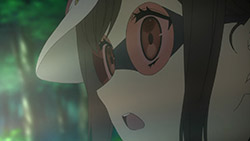 |
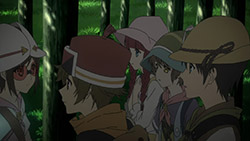 |
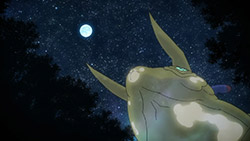 |

The show is just awesome! Anyways knows whether the light novel was translated?
Can’t find any sources on it, entries, or even raws.. Nope no translation.
Yeah I checked google and it gave no results whatsoever. I think you are right lol
It’s pretty unlikely to see proper Japanese novel translations even with a movie or television show to their name, much less one with an anime. One of the few exception I can recall, where an novel got translated, and even before its anime counterpart, was Brave Story by Miyuki Miyabe. (This was an official publication too.)
The original work is a novel, not a light novel. I don’t think the novel is translated.
According to wikipedia japan it’s a light novel http://ja.wikipedia.org/wiki/%E6%96%B0%E4%B8%96%E7%95%8C%E3%82%88%E3%82%8A_(%E5%B0%8F%E8%AA%AC)
Anyway, it’s true that you can’t find raws :/
From Japanese wiki: 『新世界より』(しんせかいより)は、貴志祐介による日本の小説作品。
小説作品 = novel
ライトノベル / 軽文学 / 軽小説 = light novel
I have raws with me. Someone can recommend Baka-tsuki or any other novel/light novel translating group to translate it.
Yeah, it’s over 950 pages in length… Nothing about this novel is LIGHT.
calm down son
I am really liking this anime. A-1 Pictures is doing a great job and the staffs are definitely setting the right tone. I should really get my hands on the original novel! But I feel that not many people are trying this anime out. I understand though, ’cause the settings and characters are not that appealing at the first look. Still, it is definitely one of the better ones in this season.
I agree that (I can hear RC community gasping, but hey, I give a credit when it’s due..) this show is the BEST among the new shows so far. I liked CODE:BREAKER, but yes, this is the best not including shows that haven’t yet aired like Jormungand S2.
Some minor things irk me a bit like some trying-too-hard-to-confuse-audience-time-skip-flashbacks or how they killed off Yui Horie after like two lines, but I still like this show.
I don’t know why but I don’t find those time skip and flashback hard to follow.
What I worry more is that this may turn in something like Naruto or Harry Potter.
Gah. I want to know more!! T.T That last sentence about Maria totally threw me off.
Did anyone else notice in the boat scene, when older Saki was narrating, the words totally match Mamoru’s lips?
I just rewatched the scene, you must mean Satoru, right? He was the one riding the boat with Saki. I’m pretty sure it was a lucky coincidence though.
Yeah, Satoru. I just thought it looked really weird. I watched the ending sequence a couple of times too, and someone mentioned that the animation might refer to more elements of the story, with what seems like a buried city under the water and all.
Also, is that the Shikigami in the preview? lol
That’s an interesting suggestion. One of the questions I had was: Where did the traces of modern Japan go? There must be ruins left somewhere in the world. It could be, as you say, underwater.
That game is more fun than Quidditch.
Went into the first episode blind and I love it. The second episode kinda sealed the deal though I’ve not signed on the dotted line yet.
I must say, this show truly gives me the creeps. There’s something odd about the village and I can’t put my finger to it. Plus the flash backs… Are they from the past of the show’s timeline? I’m guessing it might be.
Anyway, I like the show’s style and the cinematic look of it. Truth be told, watching the flashbacks and the demon stories, kept on having the thought that it’s from SilverLink or SHAFT.
This was a great episode, the story gives us more questions, but also gives some points to think about.
I loved that game with clay figures, I find it very funny.
Asobi thank you very much for your post, it’s a great job and I agree with you on several points, I can not wait for the next episode.
Flashforward again. I feel that I will have to wait for many weeks to get the answers.
how great if they can make an episode everyday instead of every week.
We need a timeskip to when they’re 17.
I’m inclined to believe all the stories the children are reciting are being used to condition/ control them so that they don’t do anything deemed unacceptable by the people in charge (ie rebel against the current establishment).
The idea of two Juryokus warping space when they clash seems suspicious. Manabu did exactly that, but nothing happened. Perhaps it is something used to ensure the children don’t combine their powers to rebel?
And is that Endou Aya doing the voice over?
That’s a good point. The “warping of space” seems like a pretty convenient story to keep them from combining their powers.
One thing this anime has got down is the suspense. There seems to be an ominous tone to almost everything. Things just seem TOO ordinary (if you discount the disappearances) and we all know that that’s going to change very quickly. We never know when everything will turn upside down. Interesting show 🙂
i am praying praying praying a chinese translation for this will be published as this anime gets popular. Not a ridiculous request I hope, since Another received this kind of treatment, and this anime rawks more epicly than Another
I get the feeling the tournament was meant to expose dissenters and degenerates. The game itself teaches kids not to use their power directly on the ball, but rather to use other objects to push and defend it. It seems like a fun challenge at first, but given the heated nature of competition, it’s an easy way to draw out students who have trouble following the rules. Similar to how Reiko’s underdeveloped Juryoku was exposed during the art test. Are they weeding out “defective” Juryoku users while their young to keep the peace?
Previews look like next episode a major event / the major plot will kick in. In the trailers it shows them older, maybe the 2nd cour is a time skip?
I’m sorry, but I’m still a little puzzled about the high praise and excitement (and I feel inclined to share). Was this really such an impressive episode? Half of it was spent watching kids playing and getting all worked up over a ball game. I understood somewhat that it was used to introduce the issue of the misuse of this Juryoku and its possible consequences, but again, I found myself waiting for the scene to pass, rather than being entertained. It was a shame that it killed whatever tension there was after that opening scene. Ah, I suppose that it’s simply me not used to the plot delivery, but even so…
I’ve read that the story truly begins with the introduction of the bakenezumi. Here’s to hoping that the next episode will deliver that and set some foundations to this series.
Oh, and please don’t stone me. Merely an honest opinion from someone with high expectations for a series with hype and excitement to match.
Aside from what you mentioned, the ball game also characterizes the children more by showing. I think that was just as important (given that they’re kinda still bland) as introducing the issue of misusing the powers and how the teachers are trying to not give them the idea that someone cheated. And I think the killing of the tension was also intended to immerse you in the games and “forget” about the opening sequence for the rest of the episode.
I did like these 1st 2 episodes a lot but I can see your point(unlike those that just didn’t understand what they watched, yet complain). For me, these 2 episodes (more so in episode 2) were mostly world-bulding episodes that require you to immerse yourself in their world (after the opening scenes)rather than wait for twists and shocking events to happen for you to truly enjoy it. Then they intentionally distract you right before the ED using Older Saki’s narration to remind you that a lot of things are wrong in their world.
I think it really worked for me because, I too, almost forgot about the 2 children who disappeared before future Saki mentioned it.
The episode was every bit as engrossing as the first one, mostly because of chilling atmosphere that was still maintained at parts and the slightly relieving slice-of-life part in the middle…i really have a hunch that this is gonna be the new steins;gate (it is filled with foreboding of coming events, it doesn’t rely much on action or fan service, since the characters and its story are its main sell)
this anime is probably the best of the season currently (inb4 Psycho;Pass and Robotics;notes come out)
With the ball-rolling contest, I was like “I really don’t want to watch a sports series.”
But, the casual and quiet indifference of fellow students disappearing, her mother’s acting like
she knows much more than she lets on, and the introduction of the ‘worker’ creatures intrigues
me quite a bit… I get the feeling that all of these are very significant events that this series will
not forget about.
In looking back, the time spent on the “game” maybe was to show the audience the team dynamics,
the characters’ engagement and (their learning to) focus on a common objective, something that
is more important then their individual powers, that will be needed/used in the story’s future.
I also like that the kids are not cookie-cutters of each other. At this point, they seem very distinct
individuals to me. I still get a
Dennō Coilfeel, which is good.I admit, the flow of the episode is a little rough, with some explanations given to its bewildered
viewer after the fact (I’d be nice to know the rule that was broken in the game before hand so its
audience could go – hey – foul!!), but there’s still some interesting potential here.
After reading with others have wrote, I love that there are so many different opinions about
what each watched. To me, this is the strength of a good story – that it touches each of its
viewers at a personal level and brings forth their impression of it through their own experiences.
I’m really looking to see how all of this plays out. But my biggest curiosity is will the “new”
language of the creatures be significant later?
Not really significant but they did explain the rules before the game. It was said that attacking the “pusher” was not allowed, and that you can only control your figures (or whatever those objects were). And when someone broke the rules, the teacher dismissed (not really) it as an accident, because, you know, children don’t break rules. They just don’t.
I’m guessing people who survive the tough childhood after certain age everything is revealed to them, by older generation, and so they continue the cycle of teaching their children to use their powers and to not break rules.
Older Saki’s voice sounded somewhere in mid 30s, so there’s a spoiler, she survives even for breaking rules. Either way i feel that as Saki was growing up her friends were disappearing one by one, eventually none of them were left and she was left alone. Then somehow memory alteration broke, and she remembered everything, every missing person, but soon realized it won’t last long, and that she will forget about them again, but before that happens she decided to write down everything, and so we hear her narrating it right now as she writes it down. (I’m assuming she is writing it down, since they don’t have technology or even tape recorders)
The idea of older Saki narrating all the dissapearances /events before forgetting them again is one that occured to me too. The chilling comment about Maria made at the end of the episode , as well as the ending song’s video , also leads me to believe that ony 3 of her friends (Maria , Satoru and Mamoru ) will dissapear in one way or another by the end of the series.
As for why I think Shun will be the remaining one – in the end sequence , only 3 different figures appear before Saki there-none looked like Shun , not to mention the clasped hands at the end , which appear to be Saki’s and someone elses.
Its a bit silly , coming up with an entire theory over an ending song , but there are hints that Saki may at least have a crush on Shun .
I guess we’ll just have to wiat and see how things unfold.
I didn’t like how the disappearance of their friend was totally ignored by them.
And we don’t like how oblivious and naive you are if you think they are ignoring him and not being manipulated, moron.
And ppl just can’t be polite eh??
Tht flashback scene….. tht just wrong.
(I wonder does the creepy flashback and creepy history lesson going to stay??)
And it strike me as odd tht they refer to the dissapearance of their friend offhanded-ly… Unless this means it happens frequently…. And WTH is tht namelist for and the thing tht appear with Manabu?? Copy cat??
Also, I dunno which the history lesson fits, foreshadoing Manabu or Shun??
Kinda liked the font UTW use for the Bakenezumi/Queerat.
I’m really liking this show a lot. Even though it’s world is mysterious and not revealed much yet it still sets an interesting environment.
Also that ED is so damn good. Shingo Yamashita’s touch complemented it.
the skipped strings for the ED theme <3
that song needs to come out soonerr
Fantastic episode, excellent atmosphere and world-building at its best ^_^
And i really love the folkloric horror-like tales the use every episode, i’m going to demand at least one every episode .. i also noticed each one has a unique art style that’s sometimes different from both the show and the other tales, and it also seems the tale serve a purpose similar to the creepy storybooks in Monster ….. *spoiler* from what i understood the story books were used in Monster to sort-of brainwash the children and condition them to follow a certain set of ideas .. i see the tales used in New World have a similar purpose within the story.
Also loved the new ending animation .. so beautiful and haunting and fits very well with the lyrics and the mood of the series.
I like how all the brainwashing propaganda is presented as a book of folklore-esque stories. It’s like all those fairytales adults used to spook children with, but with an even more sinister edge. It’s interesting that in Ep1 Saki was explicitly didn’t enjoy the propaganda class, contrasting Maria who thought it was grand that they were reading the unabridged version. Reading too much into it? Likely. But this anime encourages overthinking and paranoia.
I watch this show thinking I will be shown some awesome mecha/sci-fi stuff. In the description it says it won an award once won by Evangelion after all, so far nothing like that, instead what I saw has a middle-age like setting with a rather disturbing/eerie feel on the story. I was confuse when it says 1000 years to the future, I thought what it should be saying is 1000 years back. Anyways if this is really sci-fi stuff I’m very curios on how it will be revealed on this show.
My impression after 2 episodes:
Confusing but interesting…
all these class parables and physical encounters about wandering children/creation of devils/ vanishing children seem to indicate that as the societys youth, a weighty restriction is placed on obeying the words of the elders and staying within the boundaries of the society and all of its traditions / beliefs.
The distancing of the world beyond suggests a highly insular society with something either to protect or hide!
I am really enjoying this anime!!!
Right now Shin Sekai yori makes me feel a bit like a darker version of scrapped princess.